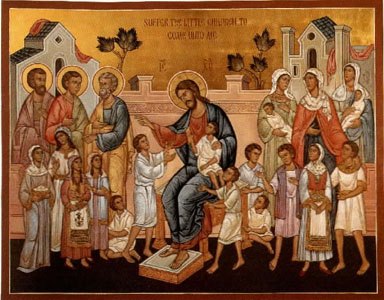It seems fathers play a particular role in society today. As the Wall Street Journal explained it, fathers who spend significant time playing with their children
- Allow children “to explore and take risks”
- Predict “children’s healthy attitudes toward relationships with others at age 16”
- Instill “emotional intelligence under fire and an ability to take prudent risks”
- Foster children’s ability to “set limits with peers”
- Help “instill self-control and social skills”
Fathers, it seems, teach the ability to discern how to act well in the variety of life’s circumstances. Moral theologians would call it practical wisdom or prudence. For Christians, this is an essential virtue as it helps people to apply one’s beliefs to day to day life.
My oldest child turns 11 next month. This enables me to reflect on my first decade as a parent, trying to teach my children this Christian practical wisdom. When my daughter was much younger, she loved fairy tales, so I figured my best chance to teach her the faith was through biblical stories. So, around bedtime, we would occasionally flip through the pages of an illustrated Bible for children.
I remember the first story she chose. She stopped at a picture of a beautiful woman in a flowing or, as my daughter termed it, “twirly” dress. It was an image of Delilah. I told her the story of Samson. When I finished, there was a long pause. Finally, she said, “Delilah is beautiful but not nice?” It was obviously a possibility that Disney and Barbie had never explored. I answered, “Yes, sometimes people who are beautiful are not nice.” I could see her wrestling with the concept until finally something clicked. “Oh! She is like Snow White’s mom!”
On another night, my daughter flipped through the book and again found a picture of a beautiful woman, in a twirly dress. It was Salome dancing. I told her the story of how Herod was so pleased with her dancing that he offered her anything she wanted and that Salome had asked for John the Baptist’s head. At the end, there was a long pause. My daughter decisively stated, “That was not nice.” I agreed, hoping to encourage this moral sentiment. She then continued, “I would have asked for a pony.”
Later, she picked out a story, again with women in dresses: the women at the foot of the cross. Theologians often speak about how we have lost a sense of the scandal of the cross. I think all that is needed is to tell the passion story to a child. There is no way to sugarcoat the violence, death, loss, and mourning.
I told her that Jesus did what was good his whole life, healing people, talking with them, feeding them, and that this upset some people so much that they killed him. This made his mom and the other women sad, which was why they were at the foot of the cross.
After a pause, my daughter chirped, “If bad people came for me, I would kick them.”
I replied, “Yes, do not let bad people take you.” I knew at the time that this was inadequate. I understand that I need to keep my children safe. This is me being a father, teaching prudence in the face of a threat. As a Christian though, I am also committed to teaching a love of the enemy. I remember thinking at that moment, do I really want her to risk the love that God calls us to? Do I really want her to be vulnerable? Should I really teach her the gospel wisdom that Herb McCabe so accurately summarized as “if you do not love, you die, and if you do love, they kill you”?
In the midst of my reflection, she exclaimed, “But if they came for you, I would go in your place.”
I am not sure what I said after this. Even now, I am still taken aback by the comment. It is no easy task to risk believing and loving, much more troubling to teach others to take the same risk. I might be able to teach some prudence for family life, friendships, school, and work. But when it comes to teaching the wisdom of the gospel, I falter.
Perhaps one way to make sense of calling God a father in today’s world is to think of God as helping us to “explore and take risks” for the gospel, to develop “healthy relationships” and “set limits with peers” so that we can do what is good for ourselves and others, and to grow in “self-control and social skills” so as to love more like Christ. In thinking back on this moment discussing the crucifixion with my daughter, I realize that so much of my work as a father (and, in the end, for all disciples) is to point to this God, as much as a risk as it is and as much as it relativizes my own fatherhood.
On a different day, my daughter turned to the end of the children’s Bible and saw a golden city. Her eyes widened. “Daddy, does heaven have gold sidewalks?” Yes, I said. “Gold trees?” Yes. “Gold, twirly dresses?” Sure, why not. “I think I want my birthday party in heaven.”
Despite the violence of the world found in all of these stories, she understood in a nascent way that the last word was not death but joy, peace and laughter. Her envisioned birthday party stood as a contrast to the anguish of the world, not as an escape but as a foretaste of the joys of the heavenly celebration strong enough to overcome evil. This was the vision that enabled the risk of love in this world.
I finally pulled myself together and said, “I bet God would let you have your party in heaven. I bet he would even bring gold ponies.”
“Do you think God would let me ride one?”



